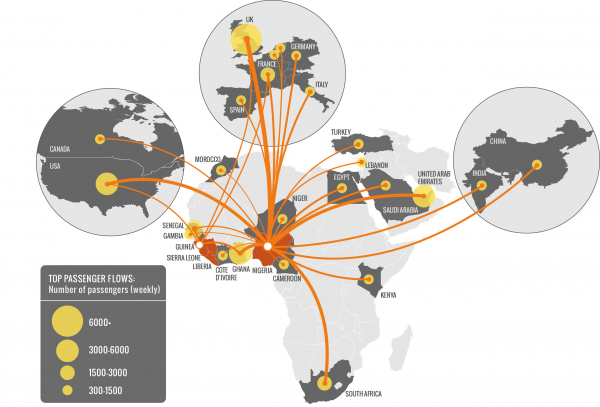Ebola and National Security
A growing chorus of health experts are expressing concern that the Ebola virus may be able to spread through droplets suspended in the air, which would explain the exponential risk in Ebola infections and deaths this year. Over the summer, the U.S. Centers for Disease Control and Prevention (CDC) issued alerts stating that the virus may indeed be transmissible by being in the same room with, or within three feet of, an infected individual. A 2012 study demonstrated that the virus was able to travel between pigs and monkeys, placed in separate cages that were never in direct contact. If Ebola is in fact transmissible by air, it could become the most devastating global health threat the world has ever seen.
 The CDC is misleading the public by stating that the virus is not "airborne" when it can in fact be transmitted by sneezes and coughs in tiny aerosol droplets which fly through the air and can be breathed in or otherwise received by someone who touches a surface which was coughed or sneezed upon. Canadian guidelines for physicians clearly state that airborne transmission of the virus is "strongly suspected" and medical personnel should protect themselves and act accordingly.
The CDC is misleading the public by stating that the virus is not "airborne" when it can in fact be transmitted by sneezes and coughs in tiny aerosol droplets which fly through the air and can be breathed in or otherwise received by someone who touches a surface which was coughed or sneezed upon. Canadian guidelines for physicians clearly state that airborne transmission of the virus is "strongly suspected" and medical personnel should protect themselves and act accordingly.
American government researchers who handle the virus wear full Level 4 bio-safety protection when handling it, not something they require or even recommend to African frontline health personnel, which is almost certainly why some of these personnel have caught the virus and died. The U.S. government is sending flimsy plastic aprons and gauze masks to the Africans with assurances that the donning and removal processes are where the majority of the risk to caregivers is realized. This is simply not true. As is evident by the precautions currently being taken in the U.S. and other developed countries, multiple layers of protection are employed by health workers, and cadavers are treated as highly infectious.
 The recent actions taken by the U.S. and other governments -- including screening airline passengers arriving from West Africa at selected airports -- are a step in the right direction, but have probably been taken too late to stop the virus from spreading in a significant way outside the region, as recent new cases in Australia, Spain, Macedonia, and the United States demonstrate.
The recent actions taken by the U.S. and other governments -- including screening airline passengers arriving from West Africa at selected airports -- are a step in the right direction, but have probably been taken too late to stop the virus from spreading in a significant way outside the region, as recent new cases in Australia, Spain, Macedonia, and the United States demonstrate.
As noted in the following graphic, as many as 6,000 passengers per week fly from points of origin in West Africa countries throughout the world, which can easily overwhelm the security protocols being established. When the SARS virus erupted in Asia in 2002-2003, air travel had to be severely curtailed in order to control the spread of the virus. That is not being done in this case: flights are not being stopped; rather, passengers are starting to be screened in a highly circumventable way -- months after the crisis became evident.

Image: currents.plos.org
The failure to stop the spread of the virus has already severely strained the health and security regimes in West Africa, and has started to impact neighboring countries. Ongoing exposure to the bodily fluids of dead victims has hastened the spread of the disease. At the same time fear-mongering has reached a peak in the worst affected countries as more and more of the region's health care workers refuse to go to their jobs, making it difficult to distribute the international medical supplies that have arrived -- however inadequate they may be. As a result of the shortage of health care workers, more and more of the infected individuals are not receiving treatment, further enhancing the spread of the disease.
The single largest potential danger from a biological weapon proliferation security standpoint stems from live sufferers as well as unburied or poorly-buried corpses of the victims. Each of these corpses represents a mother lode of biological weapon agent simply lying there for the taking. An agent (Ebola) that was once guarded as closely as highly-enriched uranium is now widely available in three countries to any terrorist bold and/or suicidal enough to steal it. Cremation should be the mandatory and exclusive method of disposition for all Ebola victims. Until all corpses are burned there will remain an ongoing risk of theft by terrorists, especially in the first three or four days after death, when the viral load in the corpse is its most virulent.
Since it first became apparent in 1976, there have been approximately 20 outbreaks of Ebola in Africa -- occurring primarily in failed states such as the Democratic Republic of Congo and Sudan. By definition, failed states are the least prepared and least capable of addressing such a problem. A combination of porous borders, high levels of corruption, poor infrastructure, and few funds to spend on public health has made these states the worst possible place for such an epidemic to occur.
By the time this strain of the virus was discovered, it had already spread to three of the poorest, conflict-affected countries in West Africa (Guinea, Liberia, and Sierra Leone). The disease is spreading fast in an area of the world that has become synonymous with failed states and terrorist groups. Ebola had spread to Nigeria, home of Boko Haram, a terrorist group that has become that country's most serious indigenous security threat. Thankfully, fast and draconian Nigerian government actions have thus far prevented a wider outbreak, yet the virus appears highly likely to revisit Nigeria.
President Obama has sent nearly 5,000 members of the U.S. military to West Africa to assist in trying to stop the spread of the disease for a very good reason -- the problem is quickly spinning out of control, and has the potential to become a serious national security concern. It is clear that the U.S. government has taken such a threat seriously. Since 2010, the Department of Defense has partnered with Tekmira Pharmaceuticals to develop a vaccine for Ebola. Tekmira was given 'fast track' authority to develop a vaccine earlier this year. It remains to be seen if the experimental vaccines that are now being selectively deployed will turn out to be widely effective, or available. First trials are beginning this week in Africa. A vaccine is the only way to potentially close the door conclusively on the threat to societies in Africa and beyond, but that presumes that any effective vaccine would become available to every person, which seems a dubious proposition.
In the interim, if a member of Boko Haram, Al Qaeda in the Islamic Maghreb or Al Shabaab were inclined to spread the disease from Africa to the U.S. or Europe, all he or she would have to do is become infected and travel to these countries before becoming symptomatic. Doing so would also bypass the screening protocols currently in effect if the infected terrorist(s) masked early symptoms with common analgesics. Once in the target country the terrorist(s) would make maximum contact before dying with people and surfaces, with potentially devastating results.
As awful as this human attack vector sounds, the greater strategic threat stems from a carefully planned and executed bioweapon attack using Ebola and distributing it over crowds with industrial sprayers, crop dusting planes or remotely piloted vehicles. If such an attack were to be successful, hundreds could be sickened at once, and health and medical resources quickly overwhelmed.
Prior to its demise, the Soviet Union was well-advanced in its weaponization of Ebola (notwithstanding the terms of the Biological Weapons Convention). These methodologies have already made their way onto terrorists' laptops, possibly compliments of Dr. Ayman Al Zawahiri himself, who travelled to Chechnya and Dagestan in the 1990s to participate in terrorist activities. The discussions quietly occurring in the corridors of the White House, CIA, Pentagon, and in other capitals throughout the world certainly point to grave concern on the part of policy and decision makers about the possibility of a worst-case scenario becoming reality.
Daniel Wagner is the CEO of Country Risk Solutions and author of the book "Managing Country Risk".
Ian Wilkie, a former international lawyer with DLA Piper and Clifford Chance and a U.S. Army infantry veteran, is the Managing Director of Archer Analytics Ltd., a private intelligence company.
You can follow Daniel Wagner on Twitter: www.twitter.com/countryriskmgmt
This article is brought to you by the author who owns the copyright to the text.
Should you want to support the author’s creative work you can use the PayPal “Donate” button below.
Your donation is a transaction between you and the author. The proceeds go directly to the author’s PayPal account in full less PayPal’s commission.
Facts & Arts neither receives information about you, nor of your donation, nor does Facts & Arts receive a commission.
Facts & Arts does not pay the author, nor takes paid by the author, for the posting of the author's material on Facts & Arts. Facts & Arts finances its operations by selling advertising space.


















